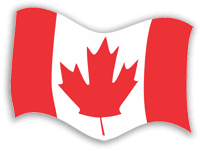|
Canadians are a strange people — confident and quiet most of the
time, but also frequently uncertain and sometimes boisterous.
Newcomers to Canada often find it difficult to get to know them,
this strange multicultural people in an officially bilingual
country. How did Canadians develop into a French-English-First
Nations-multiethnic society? What historical and institutional
forces made us what we are today? And how can Canadians
communicate what shaped them, how their governmental systems
operate, and what they think to the quarter-million newcomers
who arrive each year?
The Canadian Experience,
a collection of 52 columns by some of Canada’s best historians,
will explain who we are, where we came from, and where we’re
going. The columns will be polite — we’re Canadian, after all! —
but they’ll be blunt and point to shortcomings as often as they
sing Canada’s praises. Self-criticism is another Canadian habit.
What the columns will always be is interesting and informative,
a good guide for Canadians old and new.
The series will begin with a look at Canada’s geography and
climate — we know it’s cold! — and then discuss the basics of
Canada’s government. What’s a Governor-General?, for example,
and why should someone appointed by the Queen (and why does
Canada still have a Queen?) be the commander-in-chief of the
Canadian Forces? Why does a liberal democracy like Canada have
an appointed Senate? How do elections work here? The courts? The
public service?
Then we turn to politics: the present political parties,
Conservatives, Liberals, the New Democratic Party, and the Bloc
Québécois. Just how is it that Quebec sends separatist Members
of Parliament to Ottawa? What kind of nation permits separatists
dedicated to the destruction of Canada as it is to sit in its
Parliament? The answer, Canadians will say, is a democratic
nation. Then the series will examine the nation’s greatest prime
ministers, Sir John A. Macdonald, Sir Wilfrid Laurier, William
Lyon Mackenzie King, and Lester “Mike” Pearson to name a few.
And then we turn to the people of Canada. The First Nations,
appropriately enough, come first, as they were the initial
inhabitants of the land that became Canada. They were followed
by the French, the British, and a host of others, settling the
land and arguing with each other over language, religion, and
political power. Over time, and especially in the last 50 years,
the population changed dramatically as immigrants came to Canada
from China, India, Latin America, Africa and the Middle East. A
formerly “white” nation became “a coat of many colours,” as
someone once described it, a nation with citizens from every
part of the globe. Soon Parliament had declared Canada a
multicultural nation, recognizing the reality.
The series then looks at the provinces and regions that make up
Canada and at the way the federal government in Ottawa deals
with the provinces and territories. Federal-provincial relations
are a critical part of Canada’s governmental system, and as some
provinces grow quickly and get richer, others lose people and
wealth. Canada is one of the few nations that attempts to
equalize wealth across the country with richer provinces
contributing funds to reach a rough balance of services for all.
It’s far from being perfect, but Canadians at least try.
The Canadian Experience
then looks at the way Canada and Britain have managed their
relations. London was the centre of the world for much of
Canada’s early colonial history, and Ottawa played an important
role in turning the British Empire into the Commonwealth of
Nations. But if Canada became independent of Britain, as it was
by 1931, its sharing a continent with the United States forced
it to deal with the giant next door. This was not always easy
and Canadians, one historian said, were the first
anti-Americans. We’ll look at how Canadians get on with Uncle
Sam.
The series ends with a long look at Canada’s military history.
Some Canadians think their nation has been and still is the
world’s best peacekeeper, and many do not even realize that
Canada has fought wars for its survival. More than 115,000
Canadians died in World Wars I and II, fighting for democracy
and freedom; others fought in Korea early in the 1950s, and
Canadians today are fighting the Taliban in Afghanistan. But
Canada has indeed been a peacekeeper, one of the inventors of
the idea at the United Nations and one of the major participants
in dozens of peace operations.
Canada’s history is a proud one. This is a nation that has never
invaded another country in its own self-interest. This is a
country that has never fought an aggressive war. Canada is a
liberal-democratic state that, of course, has its national
interests and its cherished values, and as such, it tries to
work out its domestic and foreign policies in peaceful ways.
Welcome to The Canadian Experience.
Next Instalment: The Geography of Canada
The Canadian Experience is a 52-week history series designed to tell the story of our
country to all Canadians. Sponsored by Multimedia Nova
Corporation and Diversity Media Services/Lingua Ads partners,
the series features articles by our country’s foremost
historians on a wide range of topics. Past articles and author
bios are available at http://www.cdnexperience.ca.
The Canadian Experience is
copyright © 2010-2011 Multimedia Nova Corporation.
|
List of
published "Canadian Experience" articles |
 #1 Introduction: The Canadian Experience
#1 Introduction: The Canadian Experience
